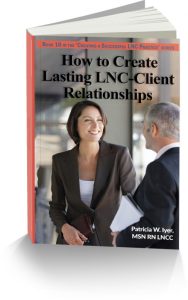Build Your Client Base
Build your business with these references


How to Create Lasting LNC-Client Relationships $29.95

How to be a Successful LNC: Tips for Your Business $29.95
Two Book Bundle Buy 2 for One Low Price of $44 and also Save on Shipping!
How to be a Successful LNC shares the secrets Pat discovered from creating and building a highly successful LNC business. Shortcut your learning, avoid expensive mistakes and dive into the knowledge Pat shares about what it takes to be successful.
How to Create Lasting LNC-Client Relationships focuses on what really counts as an LNC- having strong relationships with your clients drives your success. Working with attorneys is challenging and rewarding. You can have an aggressive marketing program to bring in new clients, but if you cannot retain them, you'll be endlessly spinning your wheels.
Grab these 2 books at a special price: Get one at $29.95 and receive the second one at 50% off (plus shipping and handling).
I highly recommend this book! Pat Iyer presents invaluable information with examples on recognizing and understanding personalities of desirable and undesirable attorney clients. This book is a must-have for LNC's who are striving to build successful attorney client relationships in their businesses, especially new LNC's.
Abby Page RN, BSN, LNC
Table of contents for How to Create Lasting LNC-Client Relationship
Expand
Here's a list of chapters:
- How to Spot Desirable Clients
- 4 Attorney Clients the LNC Should Avoid
- Nightmare Clients
- How to Spot Your Client's Personality Type and Work with It
- How to Nurture Relationships with Clients
- How Do You Know You Are Satisfying Your Clients
- How to Create Loyal Attorney Clients
- How to Make Your Client Relationships Hassle-Free
- Kindness Counts
Working with attorneys is both challenging and rewarding. Without a steady stream of attorneys who love working with you, your legal nurse consulting business collapses. Does this worry you? It should!
The core of being a successful LNC is being able to effectively work with attorneys. Are you on the top of your game, or would having concrete tips from a person who has been in the trenches with attorneys help you? You can have an aggressive marketing program to bring in new clients, but if you cannot retain them, you'll be endlessly spinning your wheels. There are secrets of why your clients will stay with you. Pat shares them in this book.
When Pat ran her independent LNC business, some attorneys stayed with her for more than 20 years.
Do you know how to spot the trouble-making attorney as soon as you have the first contact, or are you ever caught off guard? Difficult clients can cost you time, aggravation and money. Here's how to not get hooked by them.
How to Create Lasting LNC-Client Relationships explains the best way to build a solid client retention program, using strategies that work to identify the desirable clients and avoid the trouble makers.
This is an essential reference for every LNC.

There is so much valuable information in Pat Iyer's latest book, "How to be a Successful LNC: Tips for Your Business"! Pat is an excellent communicator who writes as a colleague speaking directly to You. Pat comfortably shares personal stories of successes-and mistakes-she faced and learned from, as she grew her LNC business into the profitable million-dollar company she built from the ground up. With Pat's guidance, an entrepreneurial-minded nurse can develop into, not simply an LNC, but a well-rounded entrepreneurial legal nurse consultant business owner.
Nina Latting, RN, LNC, HFSN
Table of contents for How to be a Successful LNC: Tips for Your Business
Expand
Part 1: Your Success
- Building a Successful LNC or Life Care Planning Business
- Why Most Small Businesses Fail - And What You Can Do So Yours Won't
- Top Tips for a Successful Life Care Planning Business
- Traits of Successful Legal Nurse Consultants
- The Way Successful LNCs Think
Part 2: Your Business
- Are You Working on Your Busyness or Business?
- Your Image
- Procrastination - What is the Cost?
- Destructive Technology Addiction: How Does it Affect LNCs?
- Organizing for Success
Part 3: Your Motivation
11 What is Your LNC Attitude for Success?
- How to Combat Your Worst Enemy
- How to Build Confidence as an LNC
- Exposing LNC Fears: What are You Afraid of?
- How to Tackle Limiting Beliefs
- How to Keep Stepping up your LNC Business Success
- Finding Joy Leads to Business Success
- Fueling Your Body for Success
- Tackling Wellness for Success
Do you have a deep drive to be a successful legal nurse consultant? Do you want more clients and cases? Do you want to be on the top of your game so that your business thrives? "Yes, yes, yes", you say. "But how do I get there?"
Stay ahead in the competitive world of legal nurse consulting with the tips in this new book, How to be a Successful LNC. In this clear, easy-to-follow guide, you will discover the strategies that are best for building a strong LNC business. You'll learn how successful LNCs think and behave to assure their success.
Don't wait another minute feeling frustrated about your LNC business and not sure what to do to assure success. Do you want to learn from people who know only the theory of success or from people who achieved success in your field? This book is written by Pat Iyer, who established and grew a successful LNC business to sales of a million dollars or more for the last 5 years she owned the company.

